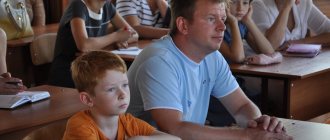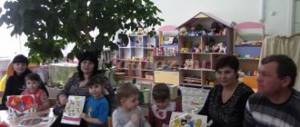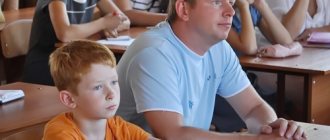Morality is the disposition of the soul, expressed in passions and actions. Aristotle
Meeting objectives:
- Show parents the importance of moral education of children in the family.
- To form a culture of communication between parents and children, the ability of parents to see negative aspects in raising their own children.
Form of the meeting
: an hour of communication between children and parents.
Preparatory work for the meeting:
1. Questioning students on the topic: What am I?
Students are given a set of adjectives. To answer the questions posed, they choose those adjectives that are more suitable: kind, beautiful, evil, smart, talented, greedy, whiny, generous, forgiving, rude, unfair, loud, restrained, calm, restless, talkative, responsible, careless liar, touchy, sacrificial, agreeing, vindictive, good-natured, callous.
- I'm at home…
- In class I...
- With friends I...
2. Questionnaire for parents on the topic: The moral qualities of my child
1.Continue the sentences using adjectives
1.My child is at home….
2.When communicating with friends, he….
3. When communicating with us (parents) he….
Note: Parents bring forms to the meeting.
Target
conducting counter questionnaires: identifying coincidences in the information received, parents’ knowledge of the moral qualities of their children;
- Preparing problem situations for resolution during the meeting.
Target:
the opportunity to publicly present to parents the best moral qualities of their children;
Progress of the meeting:
Students and their parents are seated in a classroom set up for the meeting. They sit in groups of five. Groups are formed by adults and children separately.
Visibility
: “ladder of life”, “daisy” of questions, whatman paper - the basis for a set of moral qualities and class norms;
Classroom teacher:
A boy and a girl were walking down the street. And ahead of them was an old woman. It was very slippery. The old lady slipped and fell.
- Hold my books! - the boy shouted, handed his bag to the girl and rushed to help the old woman. When he returned, the girl asked him:
- Is this your grandmother?
“No,” answered the boy.
- Mother? — the friend was surprised.
- No!
- Well, aunt? Or a friend?
- No, no, no! - the boy answered her. - It's just an old lady!
Parent meeting "Let's talk about morality"
Parents club on the topic:
"Let's talk about morality."
Chepikova Victoria Nikolaevna
, educational psychologist, highest qualification category.
Target:
attract existing pedagogical resources to increase the competence of parents in the general tasks of development and upbringing of children.
Tasks:
— create conditions for cooperation between the teaching staff and parents of students in matters of developing social and communicative communication skills in preschool children;
— inform parents about the activities of the teaching staff;
- provide parents with the opportunity to think about the problems of fostering a culture of communication in children;
— to spread the positive experience of family education.
Materials and equipment:
— handouts for parents: reminders “Play the theater with the whole family”;
— exhibition of children's books;
— cards with riddles for warming up;
— cards for parents with situations “What to do?”;
— theatrical masks for R.N.S. fairy tale "Turnip";
- two bowls of water, paper flowers made using the origami technique (green, pink, yellow);
— multimedia equipment, audio recording of E. Asadov’s poem To educate a person.
Expected Result:
— parents will gain pedagogical experience in matters of nurturing a culture of communication in preschool children, and analyze the problems of family education.
Parent club progress
Introduction.
Educator:
-
Good evening, dear parents and guests! The hour has come again when we gathered together. We are very glad to see you at our parent club. The topic of our meeting today is “Formation of social and communicative communication skills in preschool children.”
A person cannot live, work, satisfy material and spiritual needs without communicating with other people. From birth, he enters into various relationships with others. Communication is a necessary condition for human existence and at the same time one of the main factors and the most important source of its development.
The first experience of such relationships becomes the foundation on which further personal development is built. The subsequent path of his personal and social development, and therefore his future fate, largely depends on how the child’s relationships develop in the first team in his life.
As practice shows, the moral and social-communicative development of children is currently alarming. It should be noted that more and more often teachers and parents began to encounter violations in the sphere of communication culture.
But a polite word, like a good wizard, gives people a good mood, makes them happy and even heals them. “Nothing is valued so dearly and nothing comes so cheaply as politeness” from the novel “Don Quixote” by the Spanish writer Miguel. For many years, people created rules of behavior and etiquette, the purpose of which was, in addition to moral qualities (kindness, sensitivity, cordiality), to instill a sense of proportion and beauty in behavior, in conversation, in receiving guests - in a word, in everything with which we go out into society .
About 300 years ago, certain norms of behavior were equated with laws and citizens who did not comply with them were punished. So Peter I pointed out: “No one has the right to walk the streets with their head hanging and their eyes downcast or to look askance at people...”.
This and much more is what our conversation will be about today, during which we will find answers to the questions that concern us.
Pedagogical warm-up “Guess the riddles”
.
- This word comes after a gift, after dinner. This is the word they say when they thank you... (Thank you)
- I met Vitya, a neighbor - it was a sad meeting: He came at me like a torpedo from around the corner. But imagine - in vain I waited for a word from Vitya... (sorry).
- The old stump will turn green when it hears... (good afternoon).
- An ice block will melt from a warm word... (thank you).
- When they scold for pranks, we say, forgive me... (please).
Conversation with parents.
Discussions on the topic “How and where to start cultivating culture?”
Playing out life situations.
Situation No. 1.
Mom
:
Hello, Anna Ivanovna! Alyosha, why don’t you say hello? Now say “hello.” Well, why are you silent? Say hello to Anna Ivanovna, say “hello” right away. I'm waiting. Lord, and who is he so stubborn in, not a child, but punishment, only shames me. Well, tell me, how else can I teach him?”
Generalization: some children say hello willingly and affably, others only after a reminder, and still others do not say hello at all. Every case should not be viewed as a manifestation of impoliteness. It’s better to figure out why the child didn’t say hello and help him cope. Often children greet formally, without understanding the meaning of this rule.
It is necessary to explain that when greeting people, they wish each other good health and good mood. The example of adults—kindergarten employees and parents—is also important. Their friendliness and goodwill are passed on to the children.
Situation No. 2.
Two mothers talking: Hello, how are you? - Fine. Aren't you in a hurry? - No, what’s the hurry, I’m walking with the child, we’re going shopping (the child, interrupting, tugs the mother’s sleeve). Mom, look at the boy’s gun, buy me the same one. - Oh, I was in the store yesterday, I almost bought such a selection of dishes.
Child:
- Tell me, will you buy a gun? Well, tell me, will you buy it?
Mother:
- Leave me alone, let me talk calmly, I'm tired of it. So, there’s just so much to be found at the market.
Child:
Well, let's go to the store quickly, I want a gun.
Mother:
- What a child! Others’ children are like children, but my child can’t stand for a minute and won’t let me talk.
Generalization: If a child interrupts an adult or butts into a conversation, this may mean: he does not know how to listen; shows aggression towards the one he interrupts; wants to attract attention (being the center of the family universe); does not have sufficient patience; does not receive additional parental attention (one of the symptoms is hyperactivity).
We are confident that our children will learn this rule, and we, the adults, will be role models for them. And the phrase “Please excuse me that I have to interrupt you” will become truly magical.
Educator:
— Often adults are a source of infection for a child by consuming lexical garbage. What to do if a child uses rude words and profanity? (Answers).
Generalization: it is not always necessary to focus attention; if the child is small, he will quickly forget. If the child is older, you need to make it clear that you don’t want to hear such words, they are offensive, bad, good children don’t say that. You can determine the place where to throw such words (trash can, bag).
Reflections.
Teacher-psychologist: —
The famous poetess A. Barto wrote in one of her poems: “When things don’t go well, praise helps me” and with these judgments she invited us to think.
Questions for parents:
— Is it possible to agree that a child should be praised in advance when not everything works out, or should he be praised for the result? — How often, and for what, do you praise your child? For showing attention and politeness? Any progress?
Conclusion: Moms and dads, do not forget that you are a good example for your children.
Educator:
-
Dear parents, listen to the advice given by the author of the book “The ABC of Politeness” L. Vasilyeva - Gangnus: “Raising a child must begin with creating a kind, polite, tolerant, sympathetic and affectionate family atmosphere. And plus, taking into account the age of the children, you need to start with creating the spirit of the game, with a welcoming - living fairy tale that should enter your home "...
A fairy tale is one of the first types of artistic creativity that a child is introduced to. There is probably not a single child who does not love fairy tales. And we adults enjoy reading and watching fairy tales. “The fairy tale is a lie, but there is a hint in it, a lesson for good fellows!” - this expression is familiar to every person since childhood. Any fairy tale carries with it a certain experience of generations, the wisdom of ancestors, deep meaning and developmental potential. A fairy tale not only helps a child to look at complex relationships, behavior, and actions of fairy-tale characters from the outside, but also to make correct assessments and conclusions based on this and, most importantly, to implement them in everyday life.
Teacher-psychologist: —
It is the fairy tale and the game that should become good assistants in the upbringing of our children, because play in preschool age is recognized by educational psychologists as the leading activity.
In our teaching activities, we often use fairy tales to solve various educational problems. Playing out situations with your favorite fairy-tale characters allows you to achieve positive results in the moral education of preschoolers.
Dramatization in a new way p. n. With. fairy tales "Turnip"
(Parents are offered masks).
Educator:
-
Have you guessed what fairy tale? Let's rehearse (parents assign roles).
Condition - the last hero must be the smallest.
The task is to think about how the smallest hero can harm the friendly life of the team.
Playing out a fairy tale in a new way.
Educator:
-
The whole family, reincarnated as the heroes of the fairy tale, can play this fairy tale at home with the children. If there are not enough heroes, you can take toys, and inside one toy you can put a sweet prize, for example, candy, and after you pull out the turnip, you can drink tea with these candies with the whole family and discuss the actions of fairy-tale heroes.
Listening and discussing the poem
by the poet Eduard Asadov “Educating a Man” (audio recording).
Reflection “Bowl with flowers”
Educator:
-
Dear parents, let's try to look at our children from the outside. The soul of a child is “a full cup, a cup of goodness” (show bowls of water and flowers made using the origami technique, which bloom when they hit the water).
- Let's fill these bowls with magic flowers. Each flower has its own meaning (after explaining the meanings of the flowers, parents take paper flowers and place them in a bowl of water). The teacher reads the statements to the parents, the parents choose flowers and put them in the bowl.
Installation: if the child follows the rule, put a pink flower, if not always and not quite correctly - yellow, if not - green.
Statements:
— The child politely asks for help tying a hat, buttoning a coat, and thanks for the help.
- He knows how to apologize in time and says this word with the right intonation and feeling of guilt.
— When meeting, he greets warmly, when saying goodbye, he always says “Goodbye.”
- Doesn’t say rude (swear words).
— Honestly admits his actions.
Conclusion
: Dear parents, look at our bowls with flowers, we think that we have something to pay attention to and always have something to work on. We wish you health, patience, calmness, love, spiritual strength in order to raise our children to the heights of culture of behavior and communication.





